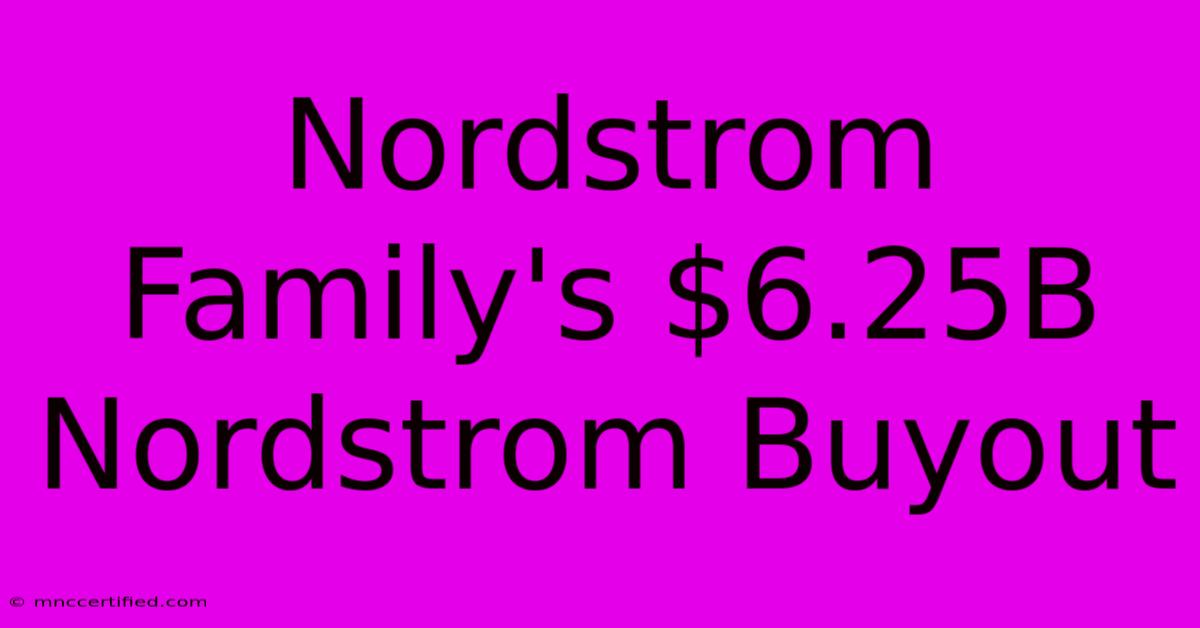Nordstrom Family's $6.25B Nordstrom Buyout

Table of Contents
Nordstrom Family's $6.25B Buyout: A Deep Dive into the Deal
The Nordstrom family's $6.25 billion buyout of the iconic department store chain sent shockwaves through the retail industry. This wasn't just a simple transaction; it was a complex maneuver with significant implications for the future of Nordstrom, its employees, and the broader retail landscape. This article will delve into the details of the buyout, exploring its motivations, potential consequences, and long-term impact.
Understanding the Buyout: Key Players and Figures
The deal, finalized in [Insert Date of Finalization], saw a group led by the Nordstrom family – including Bruce Nordstrom, Pete Nordstrom, and Erik Nordstrom – take the company private. This consortium, which also included investment firms like [List key investment firms involved], offered $4.75 per share, representing a significant premium over Nordstrom's pre-announcement stock price. The total valuation? A staggering $6.25 billion. This move effectively ended Nordstrom's nearly 120-year history as a publicly traded company.
Why Go Private? The Family's Strategic Reasoning
Several factors likely contributed to the Nordstrom family's decision to take the company private. The most prominent include:
-
Long-Term Vision: Being a private company allows the Nordstrom family greater freedom to implement long-term strategic plans without the pressure of quarterly earnings reports and short-term investor demands. This could involve significant restructuring, investments in technology, and a refocusing on their core brand values.
-
Operational Flexibility: Private ownership grants the family more flexibility in making operational changes. This could include streamlining processes, closing underperforming stores, or investing more heavily in areas like e-commerce and personalized customer experiences. This agility is often hampered by the constraints of public company reporting requirements.
-
Reduced Public Scrutiny: While public companies face significant scrutiny from shareholders and analysts, a private company operates with less public pressure, potentially fostering a more stable and focused management environment.
The Implications of the Buyout: What Does it Mean for the Future?
The Nordstrom buyout has far-reaching implications:
-
Potential for Restructuring: Expect significant restructuring efforts to enhance profitability and competitiveness. This could include store closures, layoffs, or a reevaluation of the company's product offerings.
-
Investment in Omnichannel Strategy: A key area of focus will likely be strengthening Nordstrom's omnichannel presence. This involves seamlessly integrating online and offline shopping experiences to provide customers with more convenient and personalized options.
-
Focus on Customer Experience: With less pressure from public markets, Nordstrom may be able to invest more in improving the in-store and online customer experience, potentially leading to increased loyalty and sales.
-
Increased Competition: The move could also intensify competition within the department store sector, forcing other players to adapt and innovate to maintain their market share.
The Risks and Challenges Ahead
While the buyout offers potential benefits, it also presents significant risks:
-
Debt Burden: The significant debt incurred to finance the buyout could limit the company's flexibility and increase financial vulnerability in times of economic downturn.
-
Execution Risk: Successfully implementing the family's strategic vision requires effective execution. Failure to do so could lead to negative consequences.
-
Market Volatility: The retail industry is constantly evolving, and market volatility poses a significant challenge for any company, especially one facing a substantial debt load.
Conclusion: A Gamble with High Stakes
The Nordstrom family's $6.25 billion buyout is a bold gamble with high stakes. The success of this maneuver hinges on the family's ability to execute a comprehensive and effective strategic plan, navigate the challenges of a competitive retail landscape, and manage the significant debt incurred in the process. Only time will tell if this move will ultimately revitalize Nordstrom or lead to further difficulties. The retail world will be watching closely.
Keywords: Nordstrom, Nordstrom buyout, Nordstrom family, $6.25 billion, private equity, retail industry, department store, omnichannel, restructuring, strategic plan, business strategy, investment, mergers and acquisitions.

Thank you for visiting our website wich cover about Nordstrom Family's $6.25B Nordstrom Buyout. We hope the information provided has been useful to you. Feel free to contact us if you have any questions or need further assistance. See you next time and dont miss to bookmark.
Featured Posts
-
Hilltop Honey The Factory Journey
Dec 24, 2024
-
Political Rise Of Matt Gaetz
Dec 24, 2024
-
Gaetz Ethics Probe Sex Payment Findings
Dec 24, 2024
-
Post Oppenheimer Nolans New Adaptation
Dec 24, 2024
-
Buehlers 21 M Deal With Boston Confirmed
Dec 24, 2024